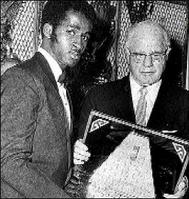Howard Campbell, Sunday Gleaner Writer
Presentation: The late Avery Brundage (right) presenting the Clarke Flores Trophy to Donald Quarrie, which he won for outstanding performances in the Pan American Games, at the Sheraton Hotel on February 27, 1972.
- File
NEVILLE 'TEDDY' McCook loves to tell the story of Mike Fennell stepping out proudly in September 1998 to present Jamaica's victorious men's 4x400 metres team with their medals at the Commonwealth Games in Kuala Lumpur, Malaysia.
"One of them said to Mike, 'So, wha'ppen to the land now, Missa Fennell'?" McCook said.
Ten years later, the remark is still amusing enough to crack up McCook. The athlete, however, was dead serious. He was referring to land promised to members of Jamaica's football team which had qualified for the 1998 World Cup in France 10 months earlier.
For all their accomplishments, some Jamaican athletes feel they have been short-changed in terms of rewards from the Jamaica Amateur Athletics Association (JAAA) and the Government. The podium jibe in Malaysia seemed to sum up those frustrations.
Appearance fees
Sprinters Asafa Powell and Usain Bolt, two of Jamaica's top charges for this month's Olympics in Beijing, China, have earned hundreds of thousands of dollars in appearance fees and endorsements for setting world records over the 100 metres. They stand to earn even more if they win gold medals at the Games.
Sixty years ago when Arthur Wint won the country's first Olympic gold medal at the London Games, big money was but a dream. Even Don Quarrie, Jamaica's first modern track star, was exempt from emoluments.
The sprinter won the 200 metres at the 1976 Olympics in Montreal, Canada, and placed second in the 100 metres. For his triumphs, Quarrie had a school named in his honour, a statue commissioned at the National Stadium, and he travelled free, business class, courtesy of Air Jamaica. But he never made any significant money.
"You've got to remember, even though he was competing all over the world, Donald was still an amateur. This whole thing about giving rewards started with the Reggae Boyz," said McCook, a former JAAA president.
Merlene Ottey never won an Olympic gold medal, but athletics' most durable sprinter represented Jamaica at six Olympics. In 1993, she won the 200 metres at the World Championships in Stuttgart, Germany, for which she was appointed an ambassador-at-large by the Government. A statue at the National Stadium was also com-missioned in her honour.
Deon Hemmings, the first Jamaican woman to win an Olympic gold medal, was given an acre of land by Alumina Partners in fashionable Ingleside, Manchester for winning the 400 metres hurdles in Atlanta in 1996.
But Juliet Cuthbert, the sprinter who ran for Jamaica at five Olympics, looks at the matter of rewards differently. She believes the JAAA and Government should think long term when dealing with athletes.
Proper medical system
"What we need is a proper medical system for our athletes like the Americans have, especially those at the bottom of the totem pole who fall on hard times," an animated Cuthbert said. "I think that's better than paying superstars who are making good money running on the circuit."
Cuthbert's fourth Olympics, in Barcelona, was her most successful and tragic. She won silver medals in the 100 and 200 metres but suffered a debilitating hamstring injury in the 4x100 metres relay.
"That ruined my career; no one from the Government or JAAA kicked in. That's when I needed help," Cuthbert said.
The Sunday Gleaner's attempts for a response from JAAA president Howard Aris were unsuccessful. Calls to his cellular phone were not answered. Already, the Government is planning more symbolic recognition for Jamaica's athletes. Last week, Information and Sports Minister Olivia Grange said a monument honouring their achievements has been commissioned and is expected to be completed in two years.

